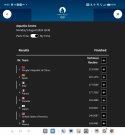I had not seen those reports, that's why I asked. I now read that there is a claim from a nutritionist on the Chinese Olympic team, Yu Liang, that Chinese athletes were tested "200 times in 10 days" by the ITA after arriving at the Olympic village, which works out to an average of 1 test per athlete every 36 hours. Particularly given that some athletes will be tested at higher rates than others, that certainly appears to be potentially disruptive.
What is not clear in these anecdotal reports is the extent to which the frequency and times of testing for Chinese athletes differs from that for the athletes of other nations. I see that there is a "general rule" in the WADA code that testing should be conducted between the hours of 0600 and 2300, but it is also asserted that an athlete under the jurisdiction of a testing authority may be called upon for testing at any time. Given the length of the Olympic day and the sheer number of athletes to be tested, I can certainly envision that post-event testing in particular would push the boundaries of this 0600-2300 "general rule". A certain level of disruption may be inevitable. The question is if that disruption is distributed equally. If Chinese athletes are being tested at significantly higher frequencies, as seems likely, it is also likely that they will encounter more testing at the earliest and latest times of the day, potentially disproportionately disrupting their sleep schedules and impairing their performance.
The ITA testing at the Paris Olympics is conducted according to a "Test Distribution Plan" developed by the ITA according to the principles of the WADA International Standard for Testing and Investigations. So far as I can tell from that document, there is no pretense to equality in testing, rather the only constraint on differential testing is that such must be driven by legitimate anti-doping aims and considerations such as the level of perceived risk and reward, most certainly including background factors such as athletes having previously recorded AAFs for Trimetadizine, whether subsequently attributed to environmental contamination and closed with ADRV recorded or not...
All tests are meant to be entered into WADA's ADAMS database, so if there is an inequitable or otherwise objectionable pattern of testing, the data should exist to demonstrate that. Less clear is who has access to what data in that database, more specifically if any organ that might be minded and empowered to advocate for the interests of China's athletes has access to the data necessary to do so. After all, for certain purposes it is not sufficient to observe that e.g. certain elite Chinese swimmers were tested on three occasions after midnight and twice before 0600, you also need to be able to demonstrate that this schedule was unnecessary and that athletes from other nations were not subjected to similar schedules. That the Americans were not immediately jumping up and down about China recording 28 AAFs in early 2021 suggests that USADA does not have access to that level of data.


